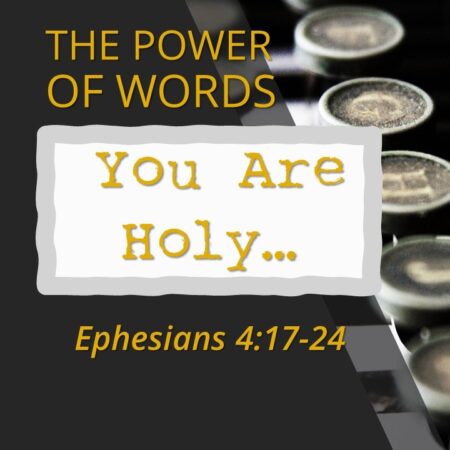1 Samuel 4:1-22 Deuteronomy 10:12-13 Malachi 1:6 Malachi 1:13-14 Malachi 2:1-9 Malachi 3:13-15 Malachi 4:1 John 4:23-24 Hebrews 12:25-29
"Worship" Tagged Sermons
Carmen Joy Imes “Bearing God’s Name”
“The Israelites lived in a time when people were desperate to know what the gods were saying. Since the god’s didn’t normally SPEAK audibly as you and I do, priests were trained to read the signs they left in the natural world. Sometimes they manufactured situations in which the gods could reveal things to them, such as the elaborate rituals in which they dropped oil or flour into water and interpreted the results. They sacrificed animals and studied their livers or intestines for clues what the gods were thinking or what they would do next.
They watched for strange births of newborn animals with defects. THEY STUDIED THE STARS. They contacted the dead, doing whatever it took to forecast the future or discern the will of the gods. An answer was not guaranteed. Sometimes they simply could not figure out what the gods wanted.”
Barclay’s in his commentary on Matthew writes:
The Magi were originally a Median tribe. The Medes were part of the Empire of the Persians; they tried to overthrow the Persians and to substitute the power of the Medes. The attempt failed. From that time the Magi ceased to have any ambitions for power or prestige and became a tribe of priests. They became in Persia almost exactly what the Levites were in Israel. They became the teachers and instructors of the Persian Kings. In Persia no sacrifice could be offered unless one of the Magi was present. They became men of holiness and wisdom.
These Magi were men who were skilled in philosophy, medicine and natural science. They were soothsayers and interpreters of dreams.
In those ancient days all men believed in astrology. They believed that they could foretell the future from the stars, and they believed that a man’s destiny was settled by the star under which he was born.
It was not difficult to see how that belief arose. The stars pursue their unvarying courses; they represent the order of the universe.
If then there suddenly appeared some brilliant star, if the unvarying order of the heavens was broken by some special phenomenon, it did look as if God was breaking into His own order and announcing some special thing.”
It may seem to us extraordinary that these men should set out from the East to find a king, but the strange thing is that, just about the time when Jesus was born, there was in the world a strange feeling of expectation, a waiting for the coming of a king. Even the Roman historians knew about this.”
Suetonius in the “LIFE OF VESPASIAN” writes:
“There had spread over all the Orient an old and established belief, that it was fated at that time for men coming from Judea to rule the world”
Tacitus in “Histories” writes:
“there was a firm persuasion that at this very time the East was to grow powerful, and rulers coming from Judea were to acquire universal empire.”
Josephus in “Wars of the Jews” writes:
“The Jews had the belief that about that time one from their country should become governor of the habitable earth.”
Pastor Tom Doyle in his book “Dream’s and Visions”
According to BibleArcheology.org:
“Since the early days of Christianity, Biblical scholars and theologians have offered varying interpretations of the meaning and significance of the gold, frankincense and myrrh that the magi presented to Jesus, according to the Gospel of Matthew (2:11). These valuable items were standard gifts to honor a king or deity in the ancient world: gold as a precious metal, frankincense as perfume or incense, and myrrh as anointing oil.
In fact, these same three items were apparently among the gifts, recorded in ancient inscriptions, that King Seleucus II Callinicus offered to the god Apollo at the temple in Miletus in 243 B.C.E.
The Book of Isaiah, when describing Jerusalem’s glorious restoration, tells of nations and kings who will come and ‘bring gold and frankincense and shall proclaim the praise of the Lord.’” (Isaiah 60:6)
Diplomat and Philosopher Dag Hammarskjold wrote in the book titled MARKINGS:
“Respect for the word is the first commandment in the discipline by which a man can be educated to maturity – intellectual, emotional, and moral. Respect for the word – to employ it with scrupulous care and an incorruptible heartfelt LOVE OF TRUTH – is essential if there is to be any growth in a society or in the human race.
To misuse the word is to show contempt for man. It undermines the bridges and poisons the wells. It causes man to regress down the long path of his evolution.”
Easton’s Bible Dictionary
“Holiness in the highest sense belongs to God ( Isaiah 6:3 ; Revelation 15:4 ), and to Christians as consecrated to God’s service, and in so far as they are conformed in all things to the will of God ( Romans 6:19 Romans 6:22 ; Ephesians 1:4 ; Titus 1:8 ; 1 Peter 1:15 ). Personal holiness is a work of gradual development. It is carried on under many hindrances, hence the frequent admonitions to watchfulness, prayer, and perseverance ( 1 Corinthians 1:30 ; 2 Corinthians 7:1 ; Ephesians 4:23-24).
קָדוֹשׁ “qadosh”
Qadosh literally means “to be set apart for a special purpose”.
The fundamental and core meaning, of the word “hagios”, is… “different, and unlike the rest”.
If you’re a Christian, then you are one of “the holy ones”. And do you know why you’re holy? It’s because you’re different. While we may not think of ourselves as “holy,” we are in fact set apart from the world to be Yahweh Elohim’s servants and his representatives. Yahweh set us apart for this very special purpose, to REPRESENT HIM ON THIS EARTH, not in the future only, BUT HERE A NOW. TODAY.
Matthew 6:19-34Psalm 1:1-3Proverbs 22:7Matthew 6:19-21Psalm 46:1




